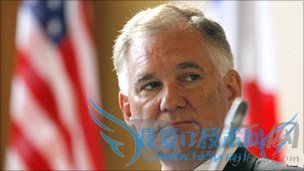��ӭ������52ijӢ��������������С��Ϊ�������Ӣ��֪ʶ�ǣ���������һ���š�����������ʷ�����ڿ�Ϯ��������ǧ�ƻ��ܶ�ʧ������������ϸ�ķ�����
������һ���š�����������ʷ�����ڿ�Ϯ��������ǧ�ƻ��ܶ�ʧ

���ű�����������Ϣ��Ȼ���������������������ξ�������֤���ˣ�˭�����IJ�����Ҫ����Ҫ����˭�õĺá�������Ȼ���������������˷����ڼ�����ǰ��һ�κڿ�Ϯ�����Գƹ���������������������ʧ�˴����Ļ�����Ϣ��
The Pentagon has admitted it suffered a major cyber attack in which thousands of files were taken by foreign hackers. Deputy Defence Secretary William Lynn said that in a March attack and other breaches, hackers had taken information on "our most sensitive systems". The admission came as the Pentagon rolled out a strategy for strengthening US cyber capabilities and addressing threats and attacks in cyberspace.��Ǵ�¥�����������������������ڿ�Ϯ���������϶�ʧ����������William Lynn��ʾ�����·ݵ�һ�κڿͽ����У���������ʧ������������Ϣ����ι���������һ��������������������ǿ����Ϣ��ȫ���Ҷ�λ��в�ͽ�����һ��ս�Ի����С�
The plan would treat cyberspace in a similar manner to land, air and sea. "In the 21st Century, bits and bytes can be as threatening as bullets and bombs," Mr Lynn said, unveiling the plan. In a speech at National Defense University in Washington, Mr Lynn said about 24,000 files containing Pentagon data were stolen from a defence industry computer network in March, marking one of the largest cyber attacks in US history.���λ�ӭͯЬ��������ϰ����Ŷ��������Ϸ��Ĺ������Ϳ��Ժ�С���ǽ�����~С�෭������ĩ��~
������ʾ������ƻ����Ὣ���ֿռ��ͬ��������������Lynn�ڽ��ܼƻ���ʱ��˵����21���ͣ������źſ�����ͬը�����ӵ�һ�����¡�����һ�����ڻ�ʢ�ٹ�����ѧ���ݽ��У�Lynn��ʾ2.4���������Ϯ���б���ȡ����Щ�����漰��Ǵ�¥�Ĺ�����ҵ��Ϣ���⼸��������ʷ�����һ�κڿ�Ϯ����
He said at least one attack - a previously revealed 2008 penetration of classified computer systems - had come from a foreign intelligence service, and in an interview ahead of the speech said the Pentagon believed the March attack had been perpetrated by a foreign government.Lynn���ݽ��к��ݽ�ǰ��һ�η������б�ʾ����Ǵ�¥���Ŵ�2008�����������в�ֹһ�κڿ͵�ȡ�Ļ������ϵ�xi���Զ�λ�ڹ�����������ڻ����������·���һ�ζ�Ȼ�ǹ����������ڲ�����Ϊ��
"We have a pretty good idea" who did it, he told the Associated Press news agency. In his speech, he said some of the stolen data was "mundane, like the specifications for small parts of tanks, airplanes, and submarines." But a great deal of it concerns our most sensitive systems, including aircraft avionics, surveillance technologies, satellite communications systems, and network security protocols," he said.�ڷ�������Lynn��ʾ���Ҷ��ڽ��۷dz�ȷ������͵�ߵ����Ϸdz��Ĺ�������Ҫ��������̹�ˡ��ɻ���DZͧ��ϸ�����ϡ�����Ҳ����һЩ�dz����е���Ϣ���纽�պ��켼�������μ��������Ǵ��似�������簲ȫЭ�鼼���ȵȡ�
Mr Lynn said cyber attacks in the future would not only focus on stealing data but also damaging US defences or even causing deaths. He added that virtual intruders have previously tried to extract files related to missile tracking systems and the Joint Strike Fighter. "Keystrokes originating in one country can impact the other side of the globe in the blink of an eye," Mr Lynn said.��ͬʱҲ��ʾ��δ���ڿ������ֻ������͵ȡ���ݣ�Ҳ��ּ���ƻ���������ϵͳ�����������������˵����Щ���ֳ����˻�ȡ�й��ڵ�������ϵͳ�����ݣ��Լ�����Ϯ��սʿ����Ϣ��һ������һ�������Ĺ����ᵼ�µ�����һ������һ�����ҵľ��ƻ������ڵ�ָ֮�䡣
He added that information technology has become so important to the US government that it "virtually guarantees that future adversaries will target our dependence on it". Mr Lynn said the Department of Defense Strategy for Operating in Cyberspace was defensive, countering earlier criticism that the strategy might be too aggressive.�����������ʾ������Ϣ�����Ѿ���÷dz���Ҫ�������Ե���δ���ĵ�����������������Ϣ����������������������LynnͬʱҲ����˵�����ĵ�����Ϣ�����Ƿ����Եģ����ǽ����Եġ�
- �����б����������۽������ѱ�����˿���������������վͬ����۵��֤ʵ��������
-
